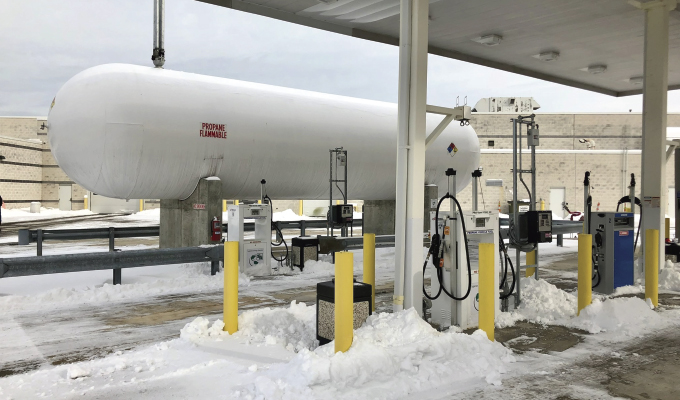Winter is just around the corner here in the United States, and the time to prepare fleets for winter is now—at least depending upon the fuel used in the fleet. Winterizing and fuel preparation for work truck fleets can be costly and time-consuming. In cold winter weather, selecting the right type of fuel can save fleet operators time and money on staff and resources.
When compared to diesel, propane autogas is a fuel with stand-out characteristics for cold weather operation. Propane autogas trucks require no extra steps or costly equipment to keep the fuel from gelling, which can cause a complete operational shutdown. Diesel trucks, on the other hand, have several additional requirements to operate in cold weather. First, they need to be plugged in overnight to keep heat in the cooling system, which allows the engine to start in cold climates. This is done by using a block heater installed in the coolant system on the engine. Second, they need fuel additives to prevent the fuel from gelling, which causes poor vehicle performance, even lack of operation, due to fuel pressure not making it to the engine.
ENTER PROPANE AUTOGAS
Innovative propane fuel systems perform well in cold temperatures due to the properties of the propane fuel and the technology behind the engine calibration. This ensures no cold-start issues and provides fleet operators with more reliability.
For instance, ROUSH CleanTech’s liquid propane fuel systems are based off gasoline engine platforms, which don’t encounter the same cold start and fuel gelling concerns as diesel engines. Propane autogas doesn’t have a true freezing point, but rather changes phase from a liquid to a vapor at -44 degrees Fahrenheit. Further, since ROUSH CleanTech’s fuel system is liquid injected, it performs well in extremely cold temperatures mainly due to the properties of the propane fuel itself.
One recommendation to prepare propane vehicles for the winter months is to make sure that the propane fuel has been properly treated with methanol. This is an industry standard practice performed by fueling providers to ensure that during cold weather months, moisture doesn’t collect in the fuel that could cause possible drivability concerns. Be sure to consult the vehicle owner’s manual for OEM-specific guidelines. Otherwise, there are no special requirements to prepare vehicles operating with a propane fuel system for winter operation.
Because of their simplicity and reliability, they warm quickly, and fleet operators consistently report saving time and money on staff and equipment. Propane-fueled trucks put fleet operators in the best position to feel confident when heading into the winter months.
ABOUT THE AUTHOR
Mario Genovese is director of customer success for ROUSH CleanTech. Find out more, visit www.roushcleantech.com or call 800.59.ROUSH.




